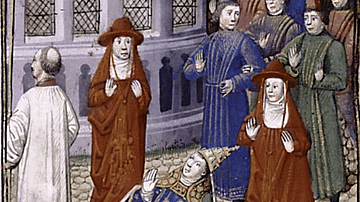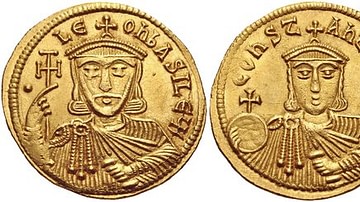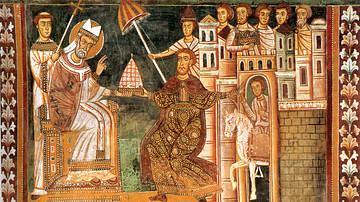Search
Search Results

Definition
Leo Africanus
Leo Africanus (al-Hasan ibn Muhammad ibn Ahmad al-Wazzan al-Fasi al-Granati, 1485-1554) was a diplomat, merchant traveller and scholar who famously voyaged from Timbuktu to the Niger River and wrote 'The Description of Africa' (La Descrittione...

Definition
Leo VI
Leo VI was emperor of the Byzantine empire from 886-912 CE. He was the second emperor of the Macedonian dynasty and is sometimes known as “Leo the Wise” in reference to his prolific literary output which ranged from orations to law codes...

Definition
Leo III
Leo III was emperor of the Byzantine Empire from 717 to 741 CE. He founded the Isaurian dynasty which ruled until 802 CE. The emperor was a talented administrator, and he revamped the empire's political apparatus and legal code. Leo's reign...

Definition
Pope Joan
Pope Joan was a legendary female pope of the Middle Ages said to have reigned from 855 to 858. After her story was popularized by Italian writer Giovanni Boccaccio (1313-1375), a statue of her was placed alongside those of other popes at...

Definition
Leo I
Leo I was emperor of the Byzantine Empire from 457 to 474 CE. He was also known as “Leo the Butcher” (Makelles) for the assassination of his patron and rival Aspar. Although his reign was lacklustre and included a serious defeat to the Vandals...

Definition
Leo V the Armenian
Leo the V the Armenian was emperor of the Byzantine Empire from 813 to 820 CE. He was of Armenian descent and the last ruler of the Isaurian dynasty which had been founded by Leo III (r. 717-741 CE). The emperor's reign, after early military...

Definition
The Description of Africa
The Description of Africa is the first comprehensive book about Africa, written by Leo Africanus, an African scholar trained in the Islamic intellectual tradition, in 1526, during the Italian Renaissance. A skillful mixture of anthropology...

Definition
Emperor Zeno
Zeno was Byzantine emperor from 474 until 491 CE. An ethnic Isaurian, Zeno was repeatedly criticized as an outsider during his reign, which was full of rebellions and attacks by the Ostrogoths. He is best known for his failed attempt to compromise...

Definition
Donation of Constantine
The Donation of Constantine (Donatio Constantini or the Donatio) is a medieval forgery dated to the 8th century purporting to be an original 4th-century document in which the Roman emperor Constantine the Great (r. 306-337) granted supreme...

Article
Martin Luther's 95 Theses
Martin Luther's 95 Theses of 31 October 1517, although they have since come to represent the beginning of the Protestant Reformation, were not written to challenge the authority of the Roman Catholic Church but were simply an invitation to...